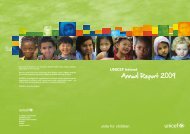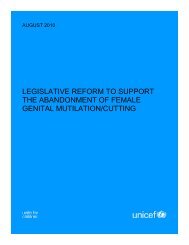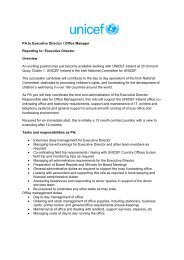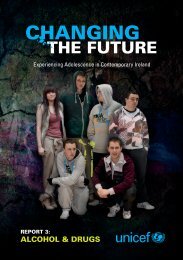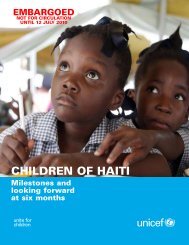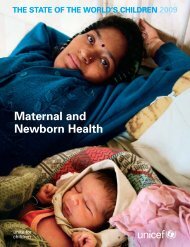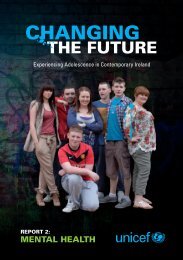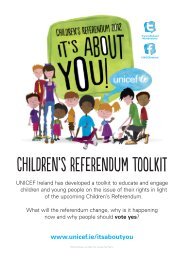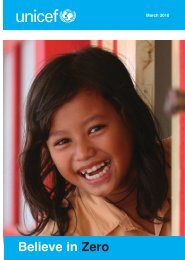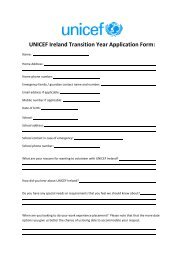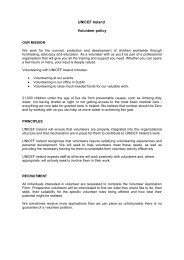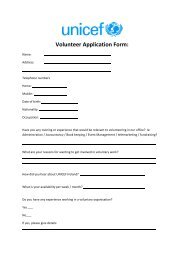Humanitarian Action for Children 2011 - Unicef
Humanitarian Action for Children 2011 - Unicef
Humanitarian Action for Children 2011 - Unicef
- No tags were found...
Create successful ePaper yourself
Turn your PDF publications into a flip-book with our unique Google optimized e-Paper software.
Latin America and the Caribbean<strong>Children</strong> and women in crisis<strong>Humanitarian</strong>funding at work:Highlights from 2010In 2010, UNICEF estimatedthat US$1.8 million wasneeded to fund its humanitarianwork in Latin Americaand the Caribbean. As ofOctober 2010, no fundinghad been received. Theregional office, however,was able to use DIPECHO(Disaster Preparedness ECHO)funds carried over from2009, as well as resourcesfrom the Governmentof the Netherlands andUNICEF emergency thematicfunds to respond quicklyand effectively when theearthquake devastated Haiti.UNICEF, in cooperationwith partners, 2 mobilizedsupplies from its hub inPanama, deployed specializedhuman resources to aid inthe response, and providedemergency response technicaladvisory and advocacysupport in the early responsestages. Throughout the year,the regional team continuedto aid country offices facingemergencies – includingBarbados, Belize, Chile,Colombia, the DominicanRepublic, Guatemala andthe Plurinational Stateof Bolivia – organizingearly warning/early actiontraining in 11 countries andconducting 17 capacitybuildingworkshops <strong>for</strong>disaster risk reduction in theeducation sector.The region of Latin America and the Caribbean is marked by extremenatural disasters, ranging from intense hurricanes, torrential rainsand flash flooding to prolonged drought, intense volcanic activity anddevastating earthquakes. In addition to the repeated loss of livelihoodthat leaves the most vulnerable populations in a cycle of insecurity,displacement caused by disaster increases risks of abuse, sexual andgender-based violence, HIV transmission, exploitation and trafficking– each already a significant problem in the region. Severe droughtsare causing serious water shortages in South America’s Gran Chacoregion from Paraguay to the Plurinational State of Bolivia, and foodand nutrition crises in Central American dry corridors stretching fromGuatemala to Honduras and Nicaragua.Currently, nearly 24 per cent of children under age 5 in the entire Latin America and Caribbeanregion are stunted due to poor nutrition. 1 Lack of preparedness <strong>for</strong> and response to these crisesincreases risks <strong>for</strong> women and children, who are already extremely vulnerable. With greatdisparities between rich and poor in the region, the main challenges to disaster response areaddressing the needs of the poorest and working with national structures <strong>for</strong> more effectivedisaster management.Meeting urgent needs and building resilience in <strong>2011</strong>UNICEF’s Americas and the Caribbean Regional Office (TACRO), together with partnersincluding government agencies across the region and other international agencies throughthe Risk, Emergency, and Disaster Task Force Inter-Agency Workgroup <strong>for</strong> Latin America andThe Caribbean (REDLAC) mechanism, will continue to strengthen its ability to respond quicklyto the array of natural disasters that characterize the region as well as humanitarian situationsderiving from socio-political issues.• The regional team will support training <strong>for</strong> country offices in emergency preparedness andresponse and use of such tools as the Early Warning, Early <strong>Action</strong> system. Preparednessactions will be developed in partnership with national governments.• Country offices and government partners will receive technical assistance to address disasterprevention and mitigation in a multi-sector coordinated approach focusing on the mostvulnerable.• TACRO will advocate regionally <strong>for</strong> disaster preparedness, response and recovery in theeducation sector by promoting the inter-agency Minimum Standards <strong>for</strong> Education inEmergencies, training workshops <strong>for</strong> first-line responders and cluster coordinators aroundthe region, and participation of national education ministries in the regional conference onrisk reduction and education.• TACRO will strengthen regional readiness <strong>for</strong> emergency WASH supply delivery, surgecapacity of experts and cluster coordinators and provision of WASH-related technicalsupport, in cooperation with regional partners.• The UNICEF regional team will support capacity-building activities and operational assistance<strong>for</strong> vaccine coverage, deworming medication and distribution of insecticide-treated mosquitonets <strong>for</strong> malaria- and dengue-endemic areas and emergency areas.• Through community-based approaches, TACRO will support UNICEF country offices andsuch partners as the World Food Programme, the World Health Organization and nationalNGOs to advocate <strong>for</strong> good nutrition practices.• The regional office will support strengthened capacities (internally and among partners) tobetter prevent and respond to all <strong>for</strong>ms of abuse, exploitation and violence affecting children,especially in disaster-prone areas. This includes training, translating and adapting guidelines,and creating a regional roster on protecting children in emergencies.54 <strong>2011</strong> UNICEF <strong>Humanitarian</strong> <strong>Action</strong> FOR CHILDREN | www.unicef.org/hac<strong>2011</strong>




